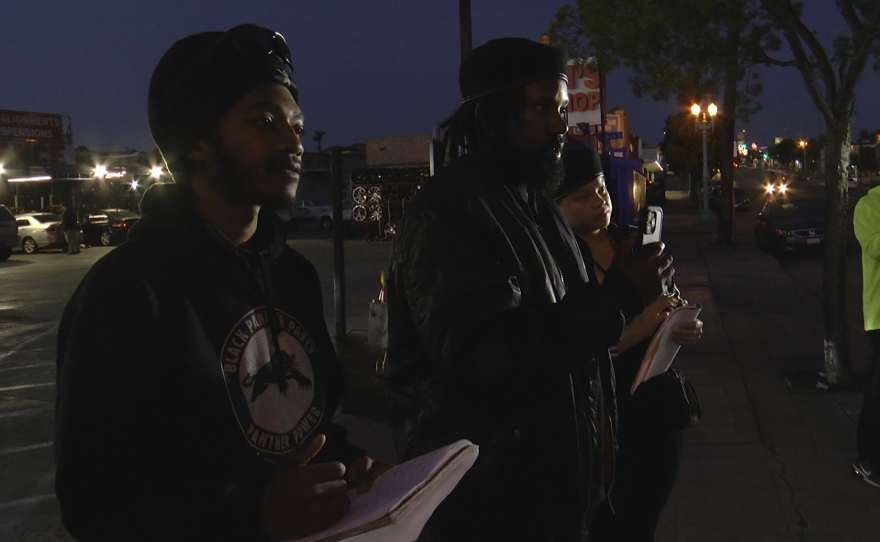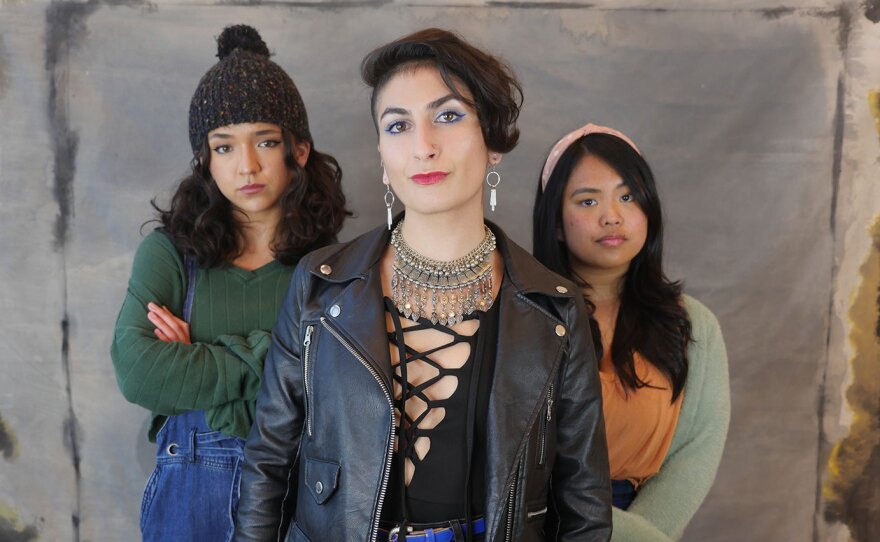The Southeast San Diego Accountability Unit meets up on a Thursday at what used to be called “the four corners of death” — a notorious site of gang violence in San Diego’s Lincoln Park neighborhood.
Against a sunset backdrop, almost a dozen men and women gather. Some are wearing head to toe blue, others black berets. They say they’re breaking generational curses.
The unit is made up of people from rivaling neighborhoods and differing loyalties — people connected to the Bloods, Crips and Black Panthers, Muslims and Christians.
They say shared enemies overshadow these differences: The police and the system.
For decades, there have been cop watch groups all over the country.
“We’re all getting oppressed the same,” said cop watcher Michael Whyte. “We’re tired of getting shot and killed and locked up for nothing. So we put them differences to the side.”
A KPBS analysis of San Diego Police Department data show police are much more likely to stop, and use force on, Black and Latino San Diegans than white San Diegans.
San Diego Police Department did not respond to multiple requests for comment.
San Diego Police Chief David Nisleit promised two years ago to reduce these disparities. But while stops decreased, racial disparities increased. Reporting by KPBS also found that many records of officer misconduct are missing any information on disciplinary action.
So the members of the accountability unit volunteer their free time and gas money to monitor the police, whose salaries they pay with their taxes.
Malcolme Muttaqee helped form the group about five years ago. Muttaqee is the name he chose when he converted to Islam in prison.
“I don’t think Islam has anything against law and order or even law enforcement,” he said, “but it has something against oppression.”

He said he just returned from a trip to the West Bank, and was surprised how much the occupation reminded him of his community. Instead of assault rifles, he said, the officers in Encanto carry Glocks. Instead of physical checkpoints, there are police stops.
With the accountability unit, he tries to protect his neighborhood from the effects of this.
The unit gives civil rights trainings and helps people connect to bail funds and file complaints against the police — hundreds since the group began, they said. And, like on Thursday night, they observe police stops.
The group piles into cars and communicates using walkie-talkies. They listen to the police scanner as they drive around looking for red and blue lights. Community members call in with tips about police stops.
They divide up roles, notetakers, recorders and talkers. They park near stops and approach the scene, maintaining some distance.
Their shirts read, “We are not afraid” on the front and, “Don’t shoot, just filming” on the back.
At the first stop, police appear to be detaining a man walking in the street.
Cop watcher Muslah Abdul-Hafeez recognizes the man from time spent feeding the homeless in his community. He isn’t drunk, he tells officers, but deaf and intellectually disabled. He offers to help the man cross the street, and the police let him go.
“Come on,” Abdul-Hafeez tells the man, guiding him with his arm across his back. The man is vocalizing in what sounds like distress. “Let’s sit down because they’re going to take you to jail if you go back in the street.”
At another stop, police question a man whose license they say isn’t currently valid. Others with the man — a woman and a nine-year-old girl holding a small white dog — stand nearby and watch. They look surprised to be joined by the cop watchers.

The car’s windshield has bullet holes in it, and there’s an open alcohol container inside. But rather than impound the car, the police allow Muttaqee to drive the man home in it.
“You see the energy shift, right?” unit member Koran Fields asks afterward. “Now they got some customer service. Now they, you know, they out there shaking hands, ‘Sorry we had to bother you, but in the state of California.’ ”
The passengers laugh. The mood is light like this all night, filled with jokes and laughter. They say they laugh because they have to.
“We’re traumatized,” Whyte says from the driver’s seat. “You know, our lives is, it’s like sick and twisted if you really think about it.
“We’ll be at the corner in front of a store, get shot at, lose one of our friends and be in front of that same store the next day. Putting flowers and candles, hanging out like nothing ever happened.”
The passengers murmur assent.
They admit observing police is risky — especially for those on parole — but say it’s worth it.
They’re more nervous about what would happen if they didn’t.
-
The Southeast San Diego Accountability Unit is a group of volunteers who have banded together to watch the police. In other news, how the city of San Diego will enforce the license requirement for short term vacation rentals.
-
"The Chronicles of Kalki" opens at Moxie Theater and sets the final avatar of the Hindu god Vishnu in a high school girl gang. Also, other arts events in San Diego, including ballet and Latin jazz.








